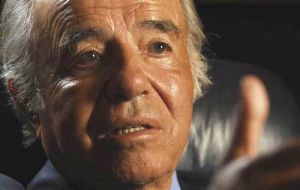MercoPress. South Atlantic News Agency
Former president to stand trial in relation to Argentina’s deadliest terrorist attack
 Carlos Menem is currently Senator; 85 people were killed in the attack in downtown Buenos Aires
Carlos Menem is currently Senator; 85 people were killed in the attack in downtown Buenos Aires Former Argentine president Carlos Menem was ordered Friday to stand trial for obstruction of justice in a probe of the 1994 bombing of a building housing Jewish charity that killed 85 people.
Justice officials said Judge Ariel Lijo ordered the trial for Menem, president 1989-1999, and former judge Juan Jose Galeano, who was in charge of the investigation for 10 years but was dismissed from the case in 2004.
Some 300 people were wounded in the attack that levelled the seven-floor Argentine Jewish Mutual Association (AMIA) building in Buenos Aires. No one has ever been convicted in the bombing.
Menem, 81, was initially charged in 2009 with concealing and tampering with evidence and abusing authority to cover up what was then called a “Syrian connection.”
Argentine prosecutors allege that Teheran planned and financed the car bombing, which was carried out by a cell from the Lebanese militant group Hezbollah. Iran has denied any role in the attacks.
Prosecutors now say there is evidence that Argentine state intelligence services and security forces covered up and erased tracks for local accomplices of the attackers during the Menem administration.
Officials previously said Menem, who was born in Argentina to Syrian immigrants, and his former staff stole evidence to hide the involvement of Syrian-Argentine businessman Alberto Kanoore Edul in the bombing, and destroyed evidence that would have incriminated him.
Kanoore Edul, whose family was friendly with Menem, died in 2010.
The bombing was the worst attack of its kind in Argentina, which has the largest Jewish community in the Americas outside the United States, and the second large-scale anti-Jewish strike in Buenos Aires that decade. In 1992, the Israeli embassy in Buenos Aires was levelled in a bombing that killed 22 people and wounded 200.
Menem, a two-term president from the ruling Peronist party, was once wildly popular, and his fondness for fast cars and women half his age and almost twice his height amused rather than angered Argentines.
But his popularity faded as corruption scandals emerged, his tough free-market policies alienated his electorate, and the economy deteriorated. Last year, he was cleared of charges that he allegedly orchestrated the smuggling of arms to Croatia and Ecuador in the 1990s.
Menem is currently serving in Argentina's senate. This does not give him immunity from testifying in court, but if he is found guilty, his fellow senators would have to impeach him first to serve any sentence.
Other people called to stand trial include the former head of state intelligence, Hugo Anzorreguy; his deputy Juan Carlos Anchezar; former police chief Jorge Palacios; and a former federal police agent.
For years Argentina has been seeking the extradition of eight Iranian officials -- including Defence Minister Ahmad Vahidi, former Prime Minister Akbar Hashemi Rafsanjani and former foreign minister Ali Akbar Velayati -- accused of being the “intellectual authors” of the bombing.
In New York Israel's UN envoy praised Argentina for reinvigorating the investigation of the 1994 deadly bombing.
“I think they're re-energizing” their work on the case, Israel's UN Ambassador Ron Prosor told reporters. ”In the past there was not a real motivation to check (the facts),“ he said. ”I see it differently today. One should give them credit for it. I see it differently today on the Argentine side.“
Tehran denied links to the bombing but offered talks with Argentina last July to start ”shedding light“ on the case. The bombing virtually froze Argentina's relations with Iran, though the two countries recently have expressed a desire for better relations.
For more than a decade Argentina appeared to do little to investigate the two attacks. But former President Nestor Kirchner vowed to reopen the cases when he took office in 2003, calling the failure to push the cases ”a national disgrace.”
Several years later former Iranian President Akbar Hashemi Rafsanjani was among those indicted by Argentine prosecutors for the 1994 bombing and sought by Interpol.
Cristina Fernandez, who is Kirchner's widow and was re-elected to a second term last year, and Argentine Foreign Minister Hector Timerman were invited to visit Israel this year by Israel's Deputy Foreign Minister Daniel Ayalon, Argentina's Jewish News Agency reported earlier this month.




Top Comments
Disclaimer & comment rules-

-

-

Read all comments“” El Turco “” still is very very powerful guy...
Apr 01st, 2012 - 09:11 am 0Obvious attempt to punish liberal-democracy proponent is obvious.
Apr 01st, 2012 - 09:23 am 0Isn't it time that the Israelis reopened investigations into the Deir Yassin Massacre where most of the Israelis involved were given state burials and the Lehi or Etzel Medals? What about looking into all the weaponry, training and intelligence that they fed to the Argentinians during the Falklands War?
I guess these things are not at the top of Israel's UN Ambassador Ron Prosor's list of todos.
At least we had a non-white (white european) president. Britain them racist never will vote for a black MP becoming PM. Just like they don't have gay marriage either... Figures.
Apr 01st, 2012 - 01:40 pm 0Commenting for this story is now closed.
If you have a Facebook account, become a fan and comment on our Facebook Page!